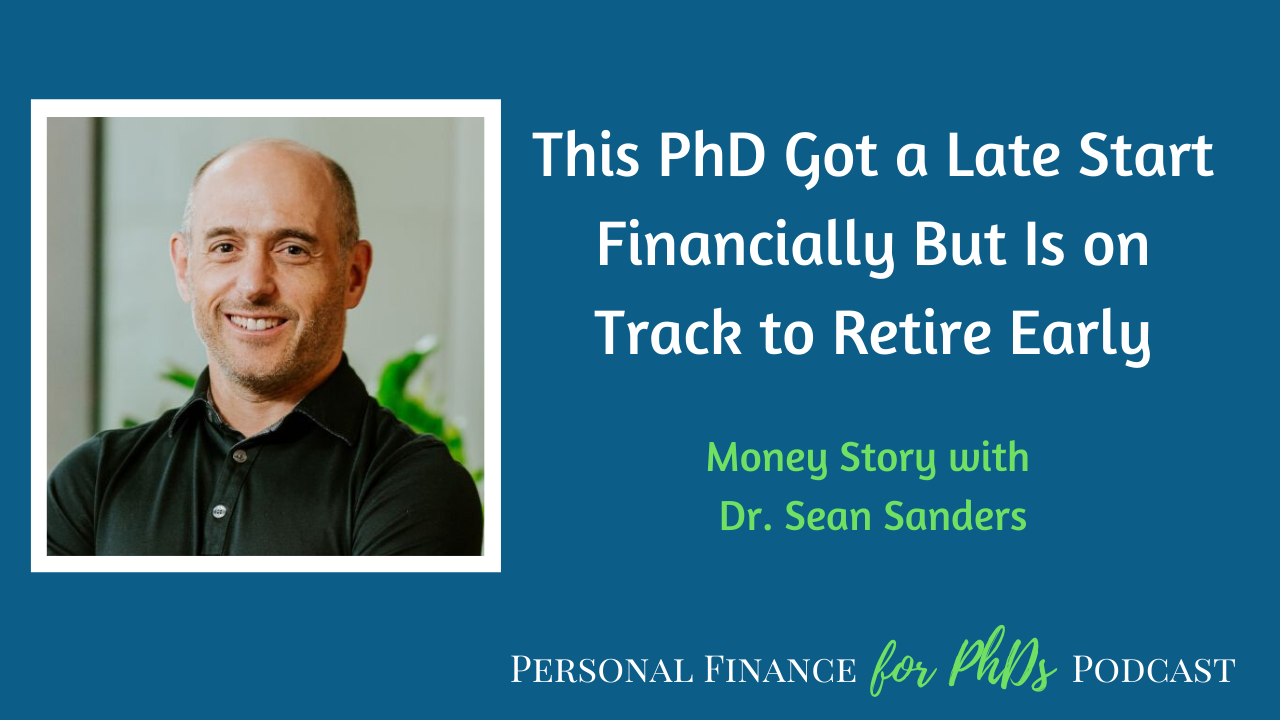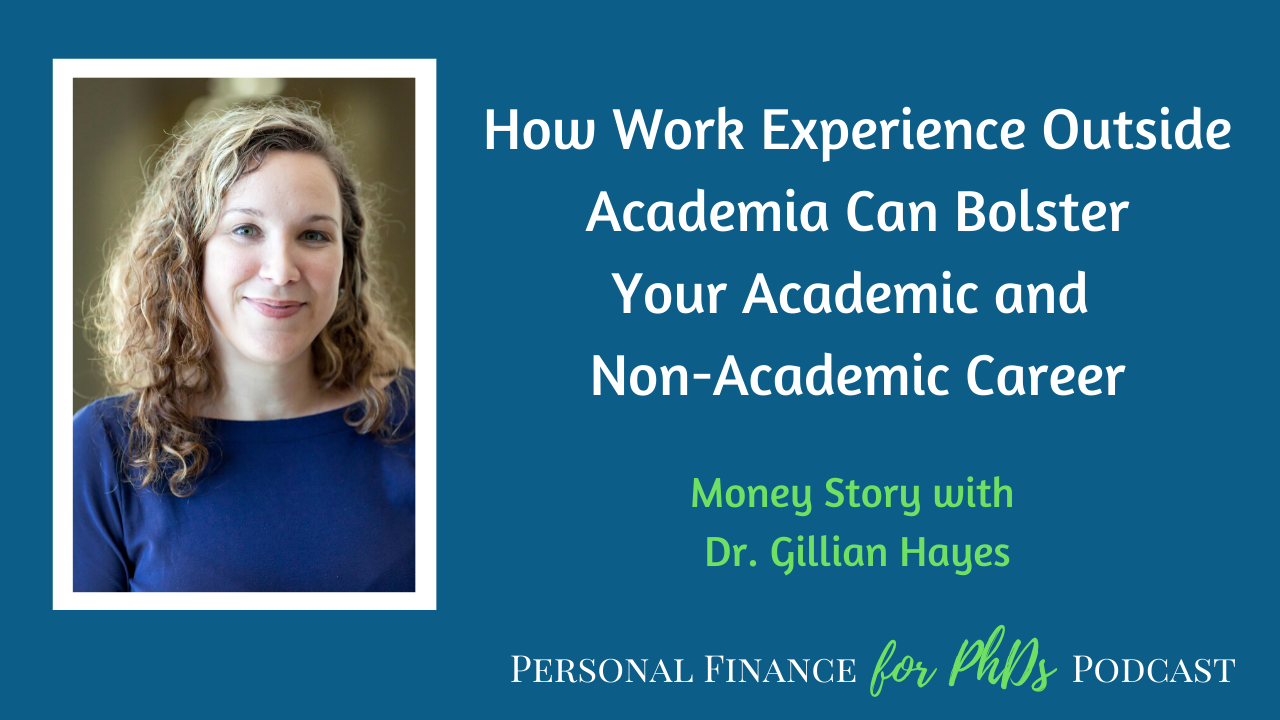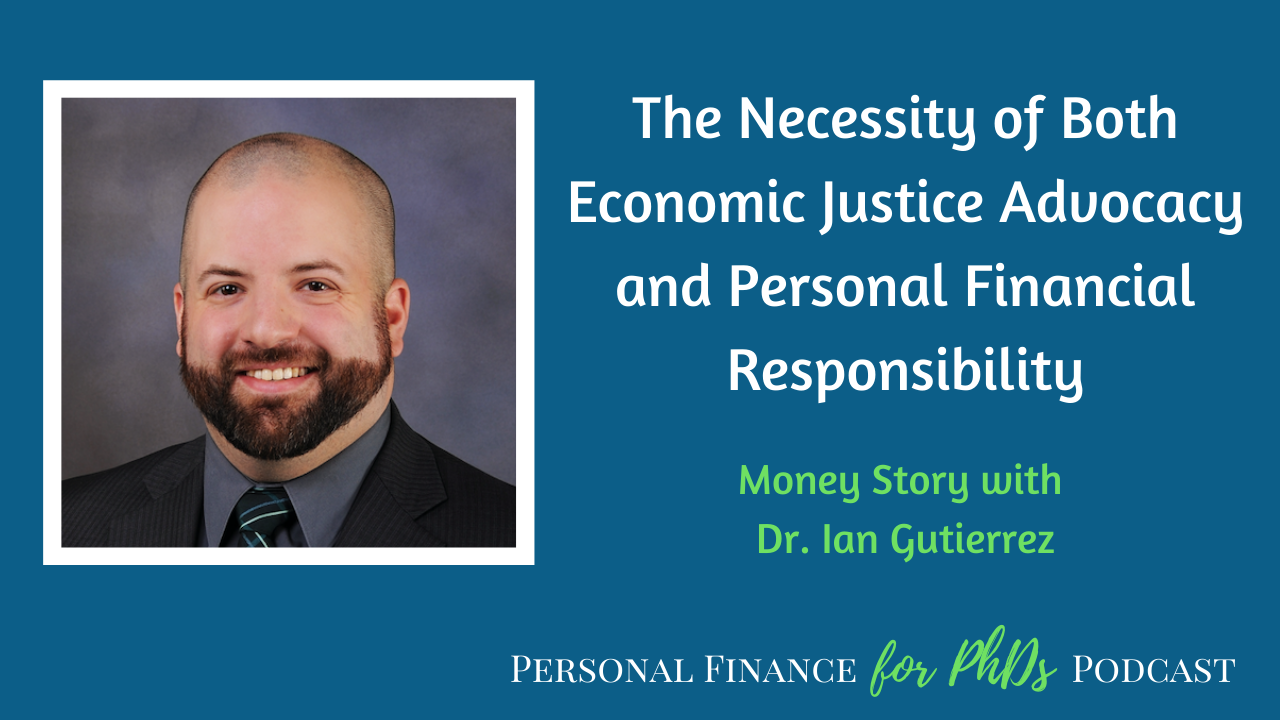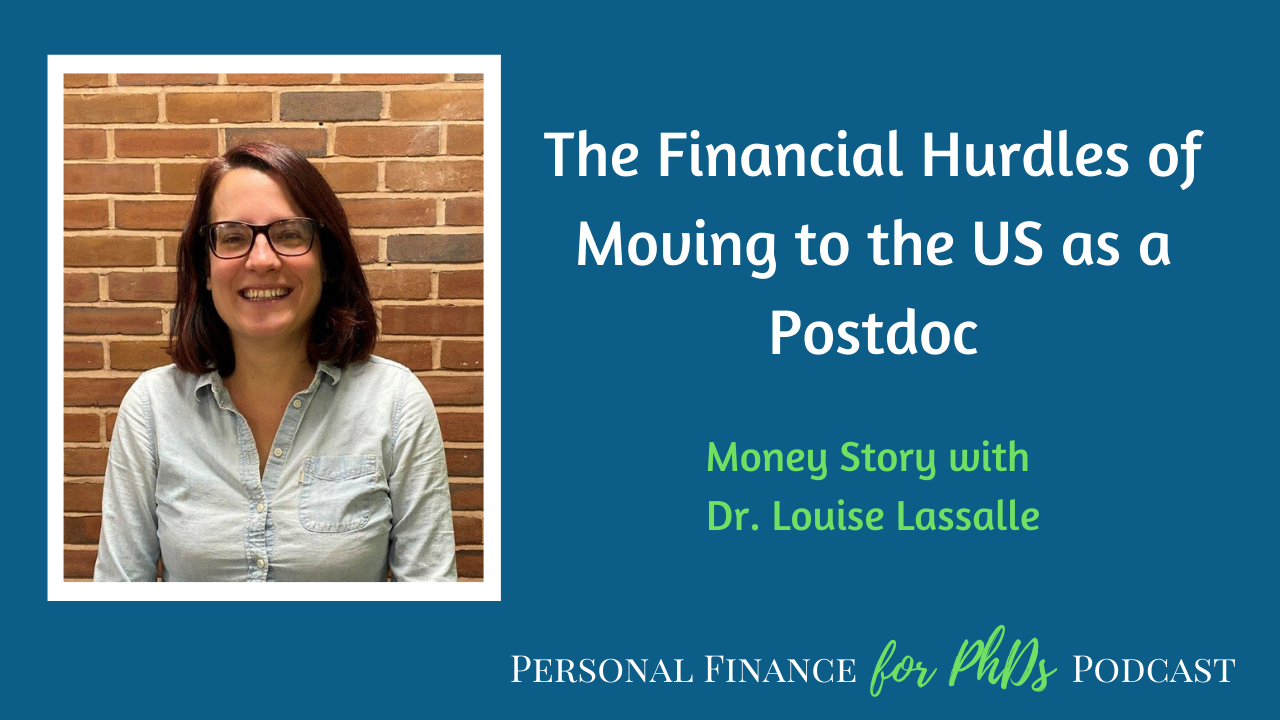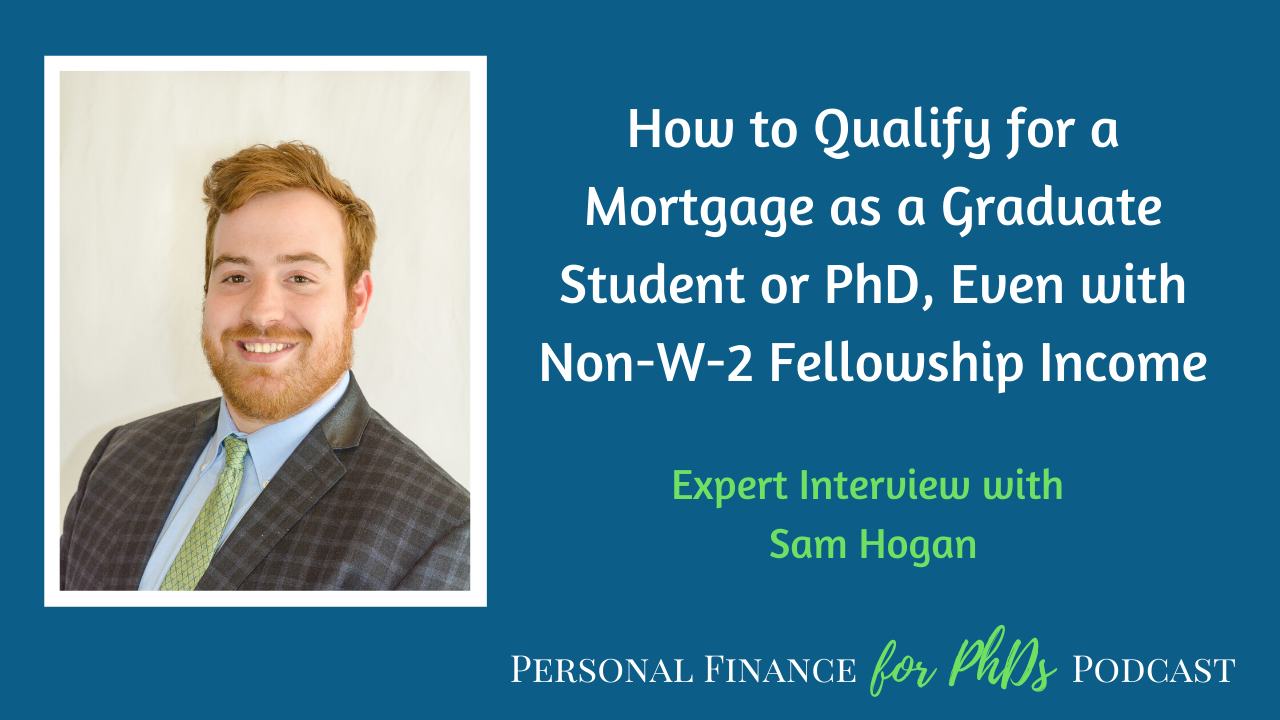In this episode, Emily interviews Tina Del Carpio, a third-year PhD student at the University of California at Los Angeles in ecology and evolutionary biology. Tina chose their PhD program in Los Angeles in no small part because their fiance’s career was tied to the city. However, when they moved in with him and started planning the wedding, cracks began to form in the relationship. When they broke up, Tina had to figure out how to extricate themself from their shared apartment and yours-mine-and-ours financial system. Fortunately, Tina landed on their feet with the help of their NSF Graduate Research Fellowship, understanding advisor, and network of supportive friends. At the beginning and end of the episode, Tina and Emily also discuss the power of self-advocacy in graduate school.
Links Mentioned
- Find Tina Del Carpio on Twitter and on their blog
- Related episode: Making Ends Meet on a Graduate Student Stipend in Los Angeles
- Personal Finance for PhDs: Tax Center
- Personal Finance for PhDs: Podcast Hub
- Personal Finance for PhDs: Subscribe to the mailing list
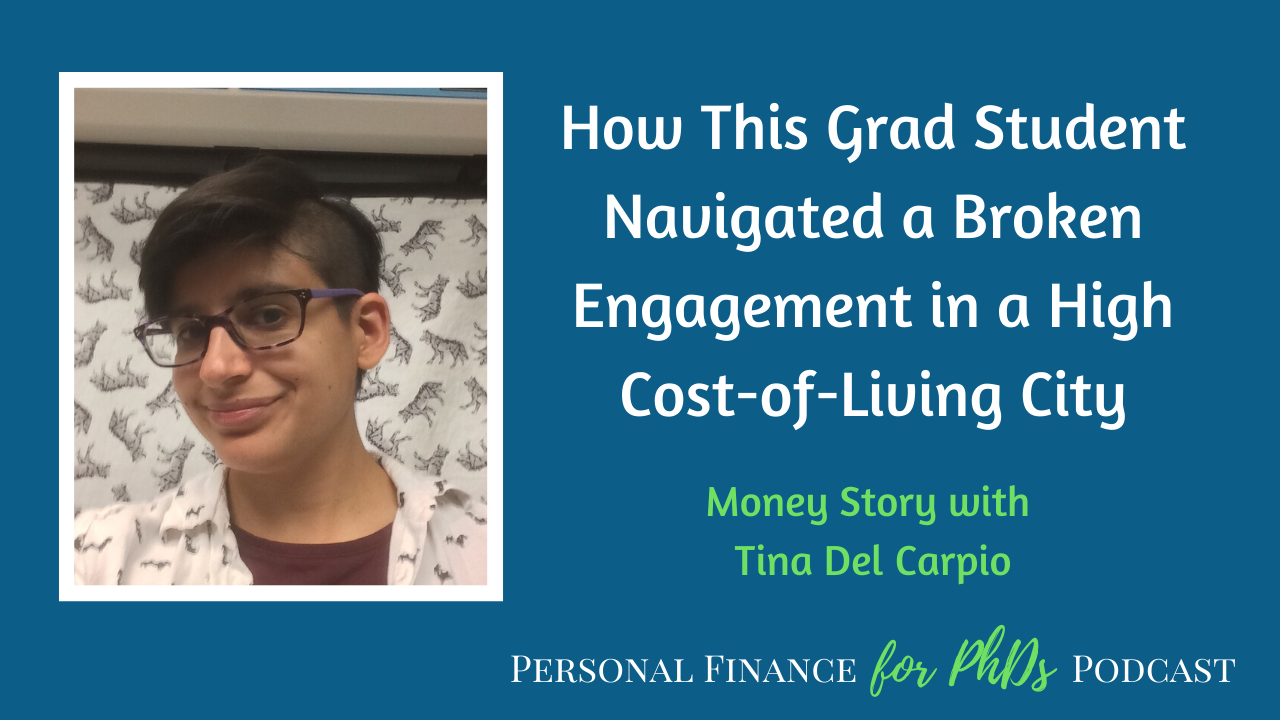
Teaser
00:00 Tina: Thankfully, we also talked about what would happen if we broke up, even before I moved out here. I was very adamant about having my own support network and knowing that I’d be able to survive without, if things just didn’t work or we’d gotten divorced or something.
Introduction
00:21 Emily: Welcome to the Personal Finance for PhDs podcast to higher education in personal finance. I’m your host, Dr. Emily Roberts. This is season six, episode ten, and today my guest is Tina Del Carpio a third year PhD student at UCLA in ecology and environmental biology. Tina chose their PhD program in Los Angeles in no small part because their fiance’s career was tied to the city. However, when they moved in with him and started planning, the wedding, cracks began to form in the relationship. When they broke up, Tina had to figure out how to extricate themself from their shared apartment and “yours, mine and ours” financial system. Listen through the end of the interview to hear how Tina handles their finances these days, and they’re excellent advice for other early career PhDs on advocating for yourself. By the way we recorded this interview in September, 2019. Without further ado, here’s my interview with Tina Del Carpio.
Will You Please Introduce Yourself Further
01:19 Emily: I have joining me on the podcast today. Tina Del Carpio, who is a graduate student at UCLA, and we’re discussing a little bit of a tough topic today, which is Tina’s breakup from about a year and a half ago. They had a little bit of financial commingling before the breakup and had to disentangle themselves from one another afterwards, which was a challenging thing to do in the midst of graduate school. Tina, I’m so delighted to have you on the podcast. Thank you so much for joining me. And will you please tell us a little bit more about yourself?
01:47 Tina: Of course. Thanks for having me on Emily. My name’s Tina Del Carpio, my preferred pronouns are they/them or she/her. I’m a second year PhD student at UCLA, or I guess about to be a third year PhD student at UCLA. My focus is on genetics and epigenetics of canids, specifically dogs and foxes.
Getting Engaged, Starting Grad School and Moving to LA
02:10 Emily: Okay, so we need to take this story back to when you started graduate school. How did you make the decision to go to UCLA? What factors were you?
02:19 Tina: Yeah, so this is actually really entangled with my relationship because at the time, my partner and I had been long distance for about five years and he was working in the film industry, so his life and his job were very tied out to LA. I geographically restricted my search to universities near Los Angeles, or ideally in Los Angeles. I was very fortunate to make a connection with a postdoc from the lab that I currently I’m a student in. I talked to her about her experience in the lab and the project that she was sort of leaving behind as she was graduating. I got really interested in that project and was looking to pick it up and met with her and the advisor, my now advisor, Bob Wayne, and we talked about the project and they helped me put together an application for the NSF GRFP. I ended up being awarded that fellowship. This all happened kind of very quickly. We actually had this conversation, decided for me to apply for the NSF, like a week before it was due. I actually only applied to UCLA in that case and figured “oh it’s a crap shoot. I probably won’t get in, and I’ll just stay on track with my other plan to just apply to a bunch of schools the following year.” But it worked out, I got funding and it was in my ideal city, and with an advisor was happy to work with.
03:49 Emily: That is an incredible story, not even the one that we’re focused on today, but I love hearing about sort of non-traditional ways of finding your way into a PhD lab. You networked your way basically into this, right? You said you first connected with a postdoc who was leaving the lab, then that connection led you to the advisor and put together this NSF application, which by the way in a week, that was successful. That is incredible! Good job on that. How did you first make that connection with that postdoc?
04:22 Tina: Yeah, so it’s funny. I literally was thinking about, okay, I changed jobs, I was working as a lab tech gaining more research experience to apply to grad school, and I had just sort of wistfully bookmarked a bunch of labs that I was interested in applying to in about a year. Then my boss announced that we’re getting a new postdoc. It happened that she was coming from one of the labs that I had bookmarkedm and when she came out to look for housing and to make some plans to settle in, in North Carolina, I kind of cornered her and was like, “Hey, so I’m interested in applying to the Wayne lab, can you tell me about the Wayne lab.” Also, it happened to line up with, I was about to be in LA visiting my ex, and so I was like, “Hey, I’m going to be there next week, can we meet up in person, and can you give me a face to face introduction with Bob?”
05:15 Emily: That is incredible. I mean, this is how networking works. It’s not like you were in some unrelated lab, right? You were already on the course to be studying something related to what you would ultimately do in graduate school. Of course there are related labs and people know each other and you run into people. That’s a wonderful story. It’s actually not that dissimilar from how I got into my graduate school, which is that my husband started — we graduate from college at the same time, but he started graduate school at Duke immediately, whereas I did a postbac year. And so, because I was regularly visiting him in Durham, I was especially interested in getting into Duke, and I basically used one of my visits to see him as like, “Hey, various professors that I’m interested in, why don’t I set up my own interview with you?” all prior to admission season even starting and made a few connections there. Ultimately applied to Duke and various other places and went through kind of the normal admissions route after that point, but then ultimately circle back around, and one of the people who I had created my own interview with ultimately, you know, offered me a position and he was my advisor during graduate school. These things, if you have the motivation, sometimes they do work out. I’m really glad that we have that story upfront.
06:28 Emily: Okay, so you were awarded the NSF GRF, that’s awesome, and you’re starting at UCLA and you’re finally living in the same city as your partner. What was going on with you guys like logistically and financially at that time?
06:40 Tina: Yeah. Things are getting a little bit more commingled and complicated at that point. When I actually got the NSF and got accepted to UCLA, because actually I initially wasn’t accepted and wasn’t even invited on the official interview weekend, but suddenly having your own funding for three years opens doors.
07:01 Emily: No kidding.
07:02 Tina: Yeah. So I got the NSF award and then shortly afterwards we got engaged, and then planned a wedding, made a lot of wedding deposits, and then I moved out into LA. Part of the navigating how to do our finances together, we basically decided we’d each keeps some of our money separate, but we opened together a checking account, a savings account, and a credit card, so we could both funnel some money into that and use that to build up a little bit of shared savings and also to pay off any expenses, groceries, rent, things related to the wedding, et cetera.
07:43 Emily: I want to ask a little bit more about that because this is becoming a very popular model, whereas maybe a few decades ago, a vast majority of couples were using fully joint finances. Some minority were using fully separate finances. Now this “yours, mine and ours” model is becoming very, very popular. As you said, most people use it for shared expenses like rent, like you were just saying, you had the wedding that you were putting down deposits for all that kind of thing. How did you decide on the split? Were you guys contributing equal amounts of money to your joint accounts? Or was it maybe by a percentage of income or how did you navigate that?
08:23 Tina: Yeah, so I guess the tricky part we were navigating was housing costs because my ex made about double what I was making, even on an NSF salary or stipend. We ended up deciding for housing that we would pay housing proportional, so he paid two thirds of our rent and I paid one third, especially moving from Durham, my rent went from $400 for my half of a two bed, two bath to we had a like $2,400, one bed, one and a half bathroom apartment. So my rent was changing significantly and also I was eating up a bunch of moving costs. So housing, we decided to do proportionately, but everything else we decided to just split 50/50.
09:10 Emily: At least it was the conversation that you had. That is a great point that you’re at least coming to a firm decision and have a strategy for addressing it. So the place that you were living, which was out of your price range, it sounds like, or I guess was it actually, so like, would you have made a different housing decision had you been moving there as a single person or maybe looking to find a roommate or like what would have been different and how much do you think you would have been paying?
09:35 Tina: Yeah, so I would have definitely looked for something different because it was…well, there was also a lot of uncertainty for me of like, what are my housing costs going to be? Even coming to LA my car insurance went up significantly and that’s actually a thing that I also commingled with my ex. He had USAA, which has a great insurance discount. I added my car onto his, onto his insurance, and so it took me a little while to navigate that and figure that out. But initially the budget I had set for myself was $800 for my rent. And then eventually, you know, I had to reconcile that when we were breaking up.
10:16 Tina: Thankfully we also talked about what would happen if we broke up, even before I moved out here, because my mom got divorced after like 20 years of marriage and I saw the financial struggles my mom went through because she had stopped working to take care of her three kids and the house and things. Then my dad lost his job and all these other problems. And of course, issues between my parents that led to them being divorced. I just watched my mom struggle a lot with her finances without my father to help support her anymore, so I was very adamant about having my own support network and knowing that I’d be able to survive without, if things just didn’t work out or if we’d gotten divorced or something. I feel like I I kinda lost the thread there, what were we talking about?
11:06 Emily: What different housing decisions might you have made? This rolls into what housing decision did you make once you guys decided to split up. Have we concluded talking about all the intermingling that was going on prior to the breakup? Is that about what the full picture was?
11:24 Tina: Yeah, I think so. I think the point I was trying to get to earlier that I lost was we talked about if we broke up and especially when we actually did break up, there was like a couple of months of us discussing it before it actually happened. But we reaffirmed that if we broke up, we would continue paying for the apartment that same way. That I would still just be paying a third and that he would continue paying two thirds, and he ended up moving out since he had family and places to go here, and my nearest family members are in Florida. I stayed living in the apartment for a couple of months until the lease was resolved and he continued to pay that two thirds of the apartment. Thankfully that was something we had discussed and agreed upon long before the breakup.
Financial Ramifications of Breaking of The Engagement
12:08 Emily: Yeah. I think we can move into kind of talking about that second phase now. It sounds like it was a long conversation. You guys had a long relationship, you were on the track to getting married, this is not something to be undertaken lightly. So you were having these conversations over a relatively long period of time. And of course, one of your concerns was how do I provide for myself in this transition to not being in this partnership any longer? So one of the things that you discussed and agreed on was the rent split. What else did you have to do once you guys decided that this breakup is official, the engagement is off? What other things had to happen to fully separate from one another?
12:46 Tina: I think the housing was the biggest thing because we broke up before our lease expired. It was like this big burden and I talked to the landlord and he told us that if we could rent the apartment to somebody else, he’d be willing to terminate our lease. Actually, I got into like kind of a sticky situation that I didn’t have the emotional energy to deal with, but where he was like, okay, I’ll advertise the apartment, but I need you guys to show the apartment. Even after we had actually moved our stuff out and we’re no longer living there, he was still like, no, you guys have to show it, I’m not gonna drive over and show it. I was still devoting time and energy to that, and it ended up still being worth it. It took a couple months to rent the apartment to somebody else, but we managed to end the lease at least a month early. For me getting back that $800 was huge.
13:43 Emily: Yeah. So the housing situation was the main one. It sounds like your ex was pretty generous, or maybe you would say reasonable, right? He was okay with continuing to pay your agreed upon portions of the rent for the amount of time necessary, but you were still doing what you needed to do to get out of it as soon as possible.
Commercial
14:03 Emily: Emily here for a brief interlude, the deadline for filing your federal tax return and making your quarters one and two estimated tax payments was extended to July 15th, 2020. I never expected to still be talking about taxes into the summer, but here we are. Post-bac fellows, funded grad students, and postdoc fellows still need major help in this area because of their unique situation. I provide tons of support to PhD trainees preparing their tax returns and calculating their estimated tax. Go to PFforPhDs.com/tax to read my free articles and find out if one of my tax workshops is right for you. I have one workshop on how to prepare your annual tax return and one how to determine if you owe quarterly estimated tax. Both workshops include videos, supplemental documents, and live Q&A calls with me go to P F F O R P H D S.com/T A X. Don’t struggle through tax season on your own. Visit my website for the exact information you need in the most efficient form available. Now back to the interview.
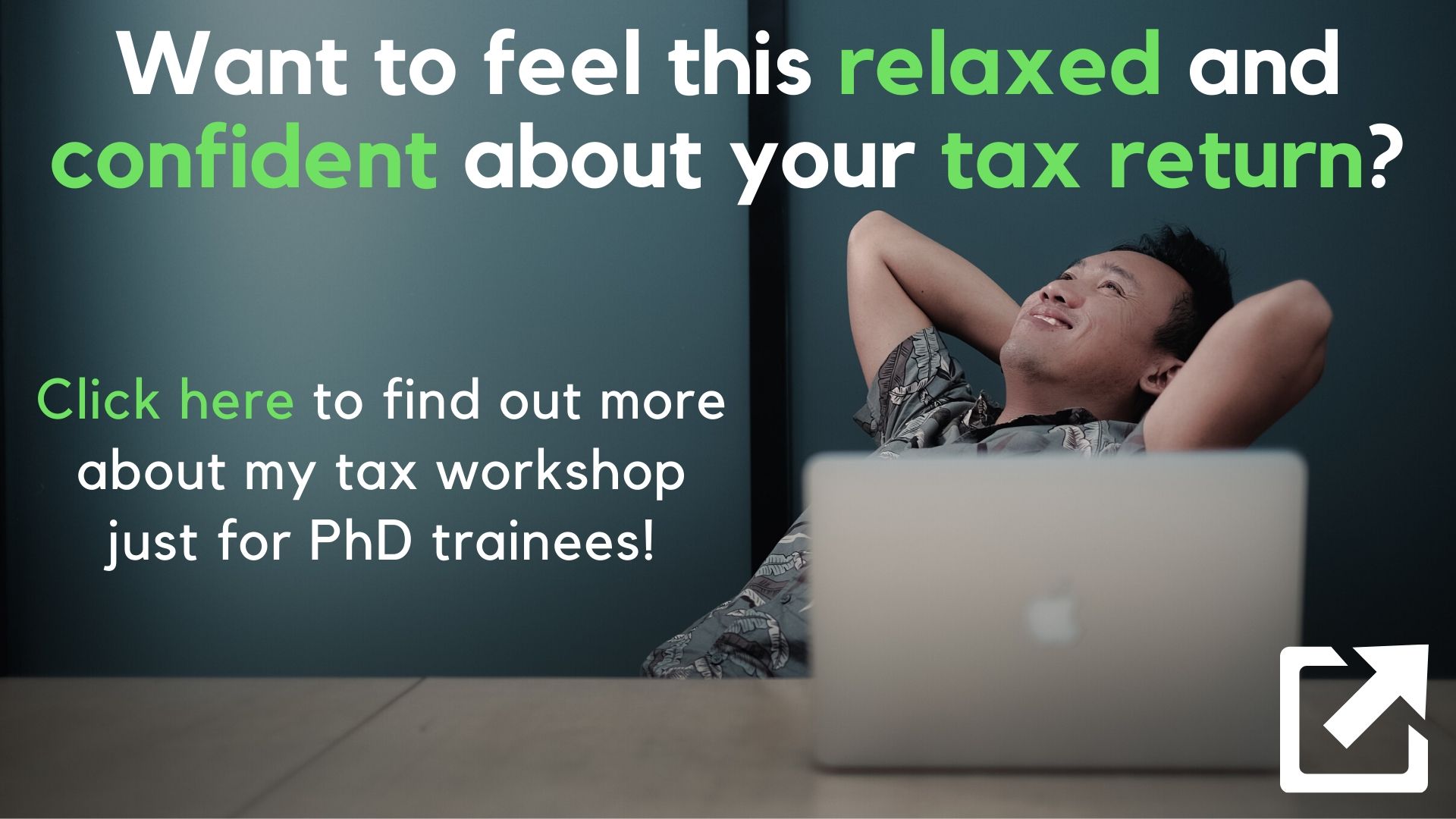
Making Budget Adjustments
15:19 Emily: So where did you move to and how did you find that next housing situation?
15:24 Tina: Yeah. So for me, I like living with other people. Actually I describe myself as painfully extroverted, so the first move was to find another roommate or find a roommate, I guess. A person in my cohort I had been spending some time with and was taking a class with and felt comfortable discussing some of my relationship stuff with, I mentioned to her like, yeah, I might be moving and looking for a new roommate soon. She was also in a housing situation, in grad student housing housing, which is really expensive here. I know Adriana, you interviewed awhile ago was living in like the family housing that’s highly subsidized, but my roommate was in the regular housing that’s like $1,300 per person per month, so not nearly as subsidized. Anyways, I found the person to live with, and then I was sort of waiting for her to finish up her paperwork to get released from her housing contract. And based on the new information I had of how much it was actually costing me to live in LA, I set a new budget of $1,100 a month for rent, and we found a two bedroom, two bathroom near campus, but far enough away that it was in our price range, and most importantly, for us, it had to be near a bus stop, so it was easy to get to campus.
16:44 Emily: Yeah. A couple of points I want to follow up within that. One is yes, I had that interview with Adriana and she was living in family housing for UCLA. I have another interview that’s been recorded, but not released as of the moment that we’re doing this interview, with Dr. Travis Seifman, and he is specifically talking about grad student housing. He’s lived in like a couple of different of the UC grad student housing, different universities. And then he’s also lived in graduate student housing at some other universities, including overseas. We have an extensive discussion around this, and one of the things that we talk about is his consternation around the price difference between family housing and single but roommates housing, and why is it that there’s such a price difference there. And so anyway, for any listeners who are particularly interested in that discussion, I’ll recommend that other interview. TBD when it will actually be published. Thanks for bringing that up.
17:39 Emily: One of the things I really like about the story is that, once you had been in LA, at UCLA for a year, you were able to, well, one, probably be more realistic about the amount of money you were able to pay in rent. Your budget went from $800 up to $1,100 per month. And then also, you found a person you wanted to live with and you guys probably had more at that point familiarity with the area and were able to do a housing search a little bit better than you could have from a distance. Of course that’s the case. My message, what I want to emphasize to listeners is that it’s a really good idea to reevaluate your housing, maybe after your first year of graduate school, whenever you’re thinking about housing in that second year, because you probably know a lot more about the area that you’ve moved to in that second iteration of the housing search. So how did that new higher rent fit in with your budget? What adjustments did you make to make that happen?
18:03 Tina: Yeah, I mean, I think I actually just had room for it. I had over budgeted other items. It took us a while to figure out the car insurance, and initially I was planning for my car insurance to double and instead it only gone up $30 and even then, it went up again when I had to separate my car insurance from my ex’s, but not as much as I was anticipating, so that was helpful. I think I ended up having to put a little bit less into savings, I think that’s where most of the difference came from. A couple of things that I have over head over budgeted initially, before I knew anything out here and then also pulling a little bit out of what I was contributing to my savings.
19:15 Emily: Another thing you did really well, there is to be sort of conservative in your estimates of your spending, in that you think you’re going to spend more than maybe you actually do, so you have that wiggle room for later adjustments within your budget.
Financial Life after the Break-up
19:27 Emily: Okay, we’ve gone through the breakup process and the separation from your ex, how are things looking in your finances today?
19:35 Tina: They’re looking okay. I just made a big purchase recently. I had a car that was a lease and I recently bought out my lease, and so that took a big chunk of my money. Basically, my car to buy out was like $12,000 with taxes and fees, and if I had been buying it from a used car dealership would have been closer to like $16,000, so it seemed like a pretty good deal. Especially since I could buy it out right, I’m not paying any interest on it. And the way I did that, is I had a considerable savings, just like paying out of my savings account. And so I paid for a third of the car, my father was able to contribute a third, and then another family member was able to lend me a third. So I did still take out a loan for my car, but from a family member who is lending it to me without any interest, of course.
20:27 Emily: Yeah. So that was a big chunk out of your funding, but that’s nice to not have that monthly expense. I mean, it’s still a monthly expense because you’re repaying the loan, but a much, much smaller one.
20:36 Tina: Yeah.
20:37 Emily: That is a great reduction in the rest of your spending. That’s great. It sounds like you and your ex were really thoughtful in this process. You had seen your parents get divorced and so you were keeping in your mind, this is a possibility. You’re going to move to LA, you’re going to live together, start commingling your finances. Maybe things won’t work out, you’re not married yet, and even after that, it still could not work out. It sounds like you did things pretty intelligently and carefully through this process, and so I think that you have like a positive example here of how this can happen, but is there anything that you, looking back, wish that you had done differently?
21:14 Tina: I think most of it was pretty settled. I wish I’d been a little bit more thoughtful about how we divided up and dealt with paying the wedding deposits, because that was a little bit of a thorn in my side when we were splitting up. And arguably my ex paid significantly more in the wedding deposits than I did, but he essentially, at the end of the day was the one who asked to call the wedding off, and so I requested that he pay me back for the wedding deposits that I had paid, which amounted to about a thousand dollars, which, again on a grad student income is a pretty significant chunk of money. And the message I got was, well, let’s see how long it takes you to move out of the apartment, and how much money is spent on the apartment, and then we can make this decision.
22:11 Tina: Then even though we saved more than that by moving out of the apartment early, then there was like some thorny issues about the engagement ring. So the engagement ring had been less than $2,000 and under the law in California, if the giver breaks off the engagement, the receiver legally owns the ring. Also my ex had told me, “oh, the ring is yours, it’s a gift to keep no matter what” and basically when I brought up the issue of my lost money on the wedding deposits, was told, “well, I let you keep the engagement ring, you should be able to sell that and recoup some of this money.” Then it turned out that he had super overpaid for the engagement ring and the money I can recoup from that is very little. I wish I had been a little bit more thoughtful about that sort of spending before we like commingled and talked a little bit more about what we would do in the situation where things broke off, but at the end of the day, I decided it wasn’t worth the emotional turmoil to be like, “well, this ring doesn’t actually cover my expenses, why don’t you take it back and you sell it and do this emotional labor and just give me my thousand dollars back.”
Navigating the Emotional Aspect of the Break-up
23:25 Emily: Yeah. I do want to come back to that point in a moment about the emotions of all of this, but I guess this is just kind of a point around splitting up in general is like, once you’re married, as you were just saying, there’s, there’s state laws that govern how relationships, how marriages separate, in terms of what’s done with the property. Sometimes it has to be figured out in court ultimately, and a lot of money can be spent on lawyers, but the really tricky thing is once you, if you’re not having that legal contract of marriage in place, and you guys were moving towards that, but not quite there yet, breaking out becomes a lot more murky. It’s something that becomes very individual and hard to navigate and something that takes a lot of energy. I just wanted to ask you, how did you manage to continue moving forward in your graduate program? Or did you? Obviously, you have ultimately, but did things stall a little bit as you’re going through this enormous personal upheaval?
24:22 Tina: I think there were two major things that helped me. There definitely was a little bit of a stalling point, but most directly related to grad school was talking to my advisor and telling him, “Hey, this is what’s going on. I’ve been a little mentally checked out because I’m trying to see whether or not my engagement is going to fall apart,” and thankfully, my advisor was very supportive of that. Around that time, actually, I had to turn in a 10 to 15 page written proposal as part of my first year requirements to slowly move towards eventually advancing to candidacy. So I talked to my advisor about it and basically just requested from my committee and extension and said, “Hey, here’s, what’s going on, can I have an extra month to turn this in?” And everybody on my committee was very supportive of that. That was number one.
25:13 Tina: Then number two was also just reaching out to friends and it took me a while to feel comfortable telling some of my lab mates and other people in grad school and just other friends I had met in the city, because at the time I had only been living here for about six months, so I didn’t have any real long-standing, deep relationships with anybody yet because I just didn’t have the time to establish them. But once I shared that information, everybody was super supportive. I actually learned that one of my grad school friends went through the same thing of also had an engagement end during her first year of grad school. They were super helpful. And then my longterm friends were unbelievably helpful. One actually flew out from Canada, where he was doing his PhD to come help me move.
26:02 Emily: Very, very sweet. Very, very wonderful to have that both new and old connections supporting you through that time. Plus, for me, this part of your story, when you were talking with your advisor and committee hearkens back to when you entered graduate school. You didn’t have to conform to the standard procedures in place for applying to graduate school. You realize, “Hey, yeah, this is a requirement in the first year, but maybe they can be flexible with me, and I’m just going to ask about it because what’s the harm in asking?” I mean, your advisor’s probably noticing that you’re not totally engaged anyway. It just comes back to that point that you are doing a great job kind of advocating for yourself and making things happen for you, and people can be accommodating if you ask them in the right way.
Best Financial Advice for Other PhDs
26:45 Emily: Tina, with the end of this interview, I’m going to ask you a question that I ask of all of my interviewees, which is what is your best financial advice for another early career PhD? And that could be related to the conversation that we’ve had today or could be completely something else.
27:01 Tina: I think actually it kind of ties into our last point of just like asking for help, of just reaching out to people and saying, “Hey, I don’t know what I’m doing, please help me.” I realized in the last couple months that investing has been a big hole for me, and I’ve been talking to one, actually one of my closest friends of over a decade and only recently learned that investing as a hobby of his. And then also like friends who are very good cooks. I never really learned how to cook as a kid growing up, so now I’m saving money by cooking at home a lot more. Just reach out to friends or coworkers or whatever and say, “Hey, I think you’re really great at this thing. I’ve noticed you seem to be really good with your money, or you’re really great at cooking, or you’re really great at this thing — how did you learn that? I’d really love to learn from you.
27:51 Emily: Nobody’s going to say no to a request phrase that way, absolutely. Wonderful, wonderful tip. And actually I know from Twitter that you are starting investing yourself and that you are listening to a podcast that really pushed you to do that — you want to mention that podcast and what you like about it?
28:08 Tina: Oh, sure. Yeah, you and I have been corresponding a little bit over Twitter and another podcast I had discovered that’s really helpful is called “Bad with Money” with Gaby Dunn. Part of what I really like about it is that I grew up with not knowing a whole lot about money and feeling like a little bit ashamed of that and just kind of feeling the differences in class, especially having gone to a private university for undergrad and my family had lost their house and lost our cars right before I went to undergrad. I just felt very distant and ashamed and all these bad emotions about money. Listening to Gaby’s podcast and being like,” Oh, it’s not just me, there are other people who feel very left out of the system,” made me feel a lot more comfortable talking about it.
28:57 Emily: That’s fantastic. Thank you so much for that recommendation. And Tina, thank you so much for this conversation today. I am sure that it is helping people in the audience who are maybe considering a breakup, or trying to navigate one, or trying to recover financially from having been through one recently, so I really appreciate your willingness to talk about this.
29:15 Tina: Great. Thanks so much for having me on Emily.
Outtro
43:30 Emily: Listeners, thank you for joining me for this episode. PFforPhDs.com/podcast is the hub for the personal finance for PhDs podcast. There you can find links to all the episode show notes, and a form to volunteer to be interviewed. I’d love for you to check it out and get more involved. If you’ve been enjoying the podcast, please consider joining my mailing list for my behind the scenes commentary about each episode. Register at PFforPhDs.com/subscribe. See you in the next episode, and remember, you don’t have to have a PhD to succeed with personal finance, but it helps. The music is stages of awakening by Poddington Bear from the Free Music Archive and is shared under CC by NC. Podcast editing and show notes creation by Lourdes Bobbio.
